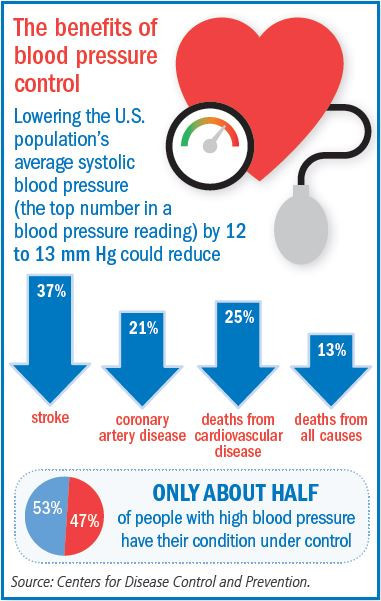Why Not Draw Blood From Mastectomy Side
Lower doses of a combination of drugs may be effective.

Approximately one in three Americans has high blood pressure, but only about half of those who do have the condition under control. One common reason: they stop taking their medications, often because of troublesome side effects such as weakness, fatigue, or a dry cough. However, taking smaller doses of several different blood pressure drugs may be a good way to address these issues, a new analysis suggests.
Researchers pooled findings from 42 studies involving more than 20,000 people with high blood pressure. All had been randomly assigned to take a placebo or one or more blood pressure drugs in varying combinations and dosages. (For the American Heart Association's list of common blood pressure drugs, including their possible side effects, see /heart-meds/blood-pressure.)
Researchers found that taking a quarter-dose of a two-drug combination was just as effective at lowering blood pressure as taking a full dose of one drug. Taking a quarter-dose of a four-drug combination was even more effective (although it's important to note that this finding came from a single, small trial). People who took smaller doses of multiple drugs had fewer side effects than those taking a single drug at the full dose. In fact, their side effects were similar to those of people who took placebos. The study was published in the July 2017 issue ofHypertension.
A trend toward lower targets
Finding safe, effective ways to manage blood pressure has been a matter of growing interest. "Nowadays, there's a trend to control blood pressure more aggressively than in the past," says Dr. C. Michael Gibson, professor of medicine at Harvard Medical School and an interventional cardiologist at Beth Israel Deaconess Medical Center. Although the prior standard was a blood pressure target of less than 140/90 for most people, a goal of 120/80 appears to be even more effective for preventing heart attacks, strokes, and death from heart disease.
Common side effects
But reaching that lower goal leaves people more prone to side effects — especially fatigue, dizziness, and fainting, which can occur when blood pressure dips too low, says Dr. Gibson. Also, each class of blood pressure medication has its own side effects. For instance, some diuretics can cause excessive urination, although this usually improves after a few weeks. However, other side effects — such as erectile dysfunction from beta blockers, leg swelling from certain calcium-channel blockers, and cough from ACE inhibitors — tend to persist. When these occur, doctors often switch the person to a different class of blood pressure drug.
More often than not, people require more than one drug to lower their blood pressure into a healthy range. And doctors have long known that it's more effective to add a second medication rather than raise the dose of the first one. Taking a lower dose of two to three different medications may be a good alternative when higher doses of a single medication cause side effects.
Check with your doctor
Of course, people can use a pill splitter to divide most of these pills into halves or quarters. But don't do this on your own, cautions Dr. Gibson. This is especially important for people who have heart disease, because blood pressure medications are the cornerstone therapy for treating many heart conditions, including heart rhythm disorders (such as atrial fibrillation) and heart failure.
But if you don't have heart disease, it's worth asking your doctor about the possibility of lowering your blood pressure medication dose. "Ideally, people should be prescribed the lowest effective dose of any medication they take," says Dr. Gibson. During any routine office visit, be sure to review all your current medications with your physician and discuss any side effects you are experiencing.
But reaching that lower goal leaves people more prone to side effects — especially fatigue, dizziness, and fainting, which can occur when blood pressure dips too low, says Dr. Gibson. Also, each class of blood pressure medication has its own side effects. For instance, some diuretics can cause excessive urination, although this usually improves after a few weeks. However, other side effects — such as erectile dysfunction from beta blockers, leg swelling from certain calcium-channel blockers, and cough from ACE inhibitors — tend to persist. When these occur, doctors often switch the person to a different class of blood pressure drug.
More often than not, people require more than one drug to lower their blood pressure into a healthy range. And doctors have long known that it's more effective to add a second medication rather than raise the dose of the first one. Taking a lower dose of two to three different medications may be a good alternative when higher doses of a single medication cause side effects.
As a service to our readers, Harvard Health Publishing provides access to our library of archived content. Please note the date of last review or update on all articles. No content on this site, regardless of date, should ever be used as a substitute for direct medical advice from your doctor or other qualified clinician.
Why Not Draw Blood From Mastectomy Side
Source: https://www.health.harvard.edu/heart-health/controlling-blood-pressure-with-fewer-side-effects
Posted by: rodriguezmolaing.blogspot.com

0 Response to "Why Not Draw Blood From Mastectomy Side"
Post a Comment